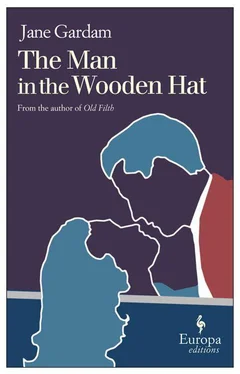On the fourth Saturday morning, the day Filth usually flew home for the weekend, he had to take documents back to the Arbitration room.
He brought his locked briefcase to the breakfast table and set it at his feet and she said, “Edward, aren’t you rather overdoing it? We could just drop the papers off on the way to the airport.”
“No, I may have to talk to the other two. They’ll be there.”
He was wearing his dark Court suit of striped trousers and black jacket, a sober tie, a starched shirt and Victorian silk handkerchief.
“I’m sure the others won’t go dressed like that,” she said.
“I dare say not, but it’s correct. I’m carrying papers.” Filth and Betty agreed to meet back at the hotel after lunch.
She took a taxi to a gallery she hadn’t been to before where there were some seventeenth-century flower paintings, and walked round and round the sunlit rooms, empty because it was not yet the Easter holidays and there were no tourists. She felt embarrassed at the clatter of her feet in the silence and tried to tiptoe from one room to the next, the sun throwing gold stripes across the polished floors. Doors stood open between the galleries, the sun illuminating other distances, withdrawing itself from foregrounds, changing direction, splashing across a distant window or open door. Inside the building, everywhere was silent and, outside, the canal was black and still. She looked for a chair and found one standing by itself and sat down. But the gallery was disappointing. She sat looking at paintings of dead hares with congealed blood on their mouths, swags of grapes, pomegranates, feathered game collapsed sightless on slate slabs. In a corner of the room was a wooden carving, the head and shoulders of a man on a plinth, the wood so black it must have lain untouched for centuries in some bog, the cracked wood perfect for the seamed and ancient face, heavy with all the miseries of the world.
But it was the hat that informed the man. It was clearly the hat that had inspired the carving. It had a tight round crown and a cartwheel of an oak brim, biscuit-thin, spread out much wider than the stooped shoulders. The hat of a religious? A pilgrim? A wandering poet? Had it all been carved from one piece of wood? Was the hat separate? Did it lift off? She became hypnotised by the hat. She had to touch it.
She heard footsteps and a gallery attendant stood in the doorway, then passed on, his careful, slow feet squeaking.
Then she heard in an adjoining gallery two voices.
“Well, what about me? What am I to do?”
“Go back to lunch at the hotel. Or a restaurant. Go and rest. We’ll be off at four o’clock.”
“I want to go to Beirut for the weekend.”
“ Beirut ! It’s across the world! And it’s nightclubs and narcotics. Whatever. .?”
“I want to go for a massage. Get my hair cut.”
“ Beirut !”
“Yes. I’m bored. It’s the place now. I’m going to Beirut.”
An overweight figure passed sloppily across an open doorway into a further gallery and it was Elsie Veneering. Another shadow followed and Elisabeth heard their voices on a staircase. “But what shall I do all the afternoon ? Where shall I go? I can’t sit having lunch alone.” Elisabeth heard a taxi drive away. She closed her eyes and listened, and very soon heard him coming back up the stairs.
He said from a distance, “I saw you as we came in. She’s gone,” and she opened her eyes on a small seedy man without much hair, feeling in his pockets for a cigarette.
She said, “You can’t smoke in here,” and he said, “No, I suppose not.”
He was wearing blue jeans and a brown shirt. He didn’t look much.
She was wearing a new long tight-fitting coat with a round fur collar and a trimming of the same fur down the front, disguising the buttons, and then circling the hem. It gave her a young waist and legs. Her hair had been cut in Amsterdam. He said, “You are much more beautiful now. But I loved your looks then, too.”
They sat in silence, he across the room on the only other chair. They looked at one another, and his smile and his eyes were as they had always been.
He said, “This bugger in the hat, he’s like that dwarf who, history relates, nicked Filth’s watch when they were kids and sold it,” and he got up and whispered in the man’s oak ear, “Albertross — I gotcher!” and lifted the wide oak brim and shouted out, “Eureka! It’s a separate entity!”
And dropped it. She screamed.
He said, picking it up, “It’s O.K. It’s bog oak. Seventeenth century, harder than iron. Oh, and the bloke’s name is Geoffrey. It says so in the label: Bought at Harrods .” He crammed the hat back on the head and the attendant came back and stared as Veneering bent to the oak ear, disarranging the hat, and said, “Hush, be still.” He crossed to the attendant and shook hands with him. “It’s my grandfather. He was a hatter. Rather a mad one. Nothing’s broken,” and the man went quickly away.
“No, I’m not laughing. I’m not,” she said, “I’m not. I’m not.”
And he took her hands and said, “When did you last laugh like this, Elisabeth? Never — that’s right, isn’t it? We’ve messed our lives. Elisabeth, come away with me. You’re bored out of your head. You know it. I know it. And I’m in hell. It’s our last chance. I’ll leave her. It was always only a matter of time.”
But she got up and walked out and down the circular staircase, the water from the canal flashing across the yellow walls. He leaned over the rail above, watching her, and when she was nearly down she stopped and stood still, not looking up.
“You’re not wearing the pearls.”
She said, “Goodbye, Terry. I’ll never leave him. I told you.”
“But I’m still with you. I’ll never leave you. We’ll never forget each other.”
On the last step of the staircase she said, “Yes. I know.”
All that summer Elisabeth gave herself to the garden. Dexters as a house was now perfect. Its terrace had been built to sit out and eat on in warm weather. The warmth of autumn and winter was beginning to be talked about, and the fact that there was no need now to escape to winters abroad. Filth sat for hours watching Elisabeth toil.
“I sit here and bask,” he said, “I am shameless. But she won’t let me anywhere near, you know. If I pull out a weed she screams and says she’d been keeping it for the Chelsea Flower Show. All I do is wash up and pour out drinks. Oh, and I can occasionally hold a hosepipe.”
Filth’s last Case, the dam at The Hague, had groaned its way to a close. The judging was over and done, and the terrace was now his stage. He worked at Hudson on Building Contracts , sat reading long and hard, mostly biographies of heroes of empire, and bird books. He kept binoculars at his elbow though he seldom picked them up. Each morning he read the Daily Telegraph wondering which political party he belonged to and hating them all. He wished Betty would discuss it with him. Or anything with him. In the evenings she sat yawning over seed catalogues and he often had to wake her up to go to bed. On Fridays they drove in to Salisbury to the supermarket and ate a modest lunch at the hotel. Every second month a crate of wine was delivered to Dexters by Berry Brothers of St. James’s. On Sundays at half past ten was church. They never missed and never discussed why. “We are hedonists,” he told friends. “The last of our kind. No chores. We are rich, idle, boring expatriates and fewer and fewer people come to see us. Have a glass of Chablis.”
The year passed. The Handover took place in Hong Kong and they watched every minute of it on television. They discussed the Governor and his three beautiful daughters as if they were their own family, and when the daughters were seen to weep, Betty and Filth wept too. They watched the Union Jack come down for the last time.
Читать дальше












